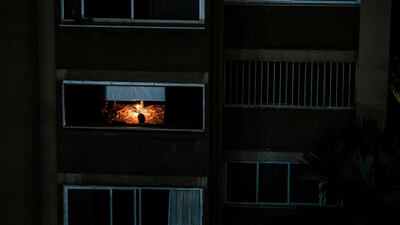An investigation carried by local Venezuela outlet Caracas Chronicles concluded on Sunday that the power cut across the country was caused by overheating in the country's largest and most important power lines. The overheating, say engineers, was likely caused by a forest fire. The line between San Geronimo B and Malena went out, overloading the other two.
According to sources in the electric industry, the power outage made the water wheels to spin out of control – also known as a load rejection – causing the protection system to kick in and the turbines to shut down. This, in turn, engulfed the country in darkness.
Power was restored late on Sunday in some areas of Caracas, sparking enthusiastic cheers. But already twice so far, the restoration of electricity has been fleeting.
The power cut has created a platform for warring President Nicolas Maduro and opposition leader Juan Guaido to battle against each other.
On Monday, Mr Guaido asked lawmakers to declare a "state of alarm" over the country's devastating blackout in order to facilitate the delivery of international aid – a chance to score points in his power struggle with Mr Maduro.
On Sunday, the embattled president vowed not to back down. "This macabre strategy to bring us to a confrontation will fail," he wrote on Twitter.
Last month, Mr Maduro used the military to block an opposition bid to bring in more than 250 tons of supplies over land from Colombia and Brazil.
Fifteen patients with advanced kidney diseases died since the blackout began on Thursday, throwing the capital city into disarray.
Venezuelans on Monday were allowed to cross into neighbouring countries, after more than two weeks of border closure. Some local media reported a humanitarian corridor was being opened for students and patients who are critically ill.
This past weekend, two Florida congresswomen met with the president of Colombia and saw where the blockades were preventing humanitarian aid from getting to Venezuela during a visit to the Columbian-Venezuelan border.
Debbie Wasserman Schultz and Donna Shalala made the visit this past weekend. The Democrats' districts have some of the largest populations of Venezuelans and Colombians in the United States.
Ms Wasserman Shultz said in a statement on Sunday that President Maduro is starving his people.
She said she wants the Venezuelan people to know United States lawmakers of both parties are standing behind opposition leader Juan Guaido.
Ms Shalala said that while at the border in Colombia she heard heartbreaking stories about Venezuelans dying of starvation and treatable diseases.
In Washington, National Security Adviser John Bolton suggested members of the military were reconsidering their support for Mr Maduro.
"There are countless conversations going on between members of the National Assembly and members of the military in Venezuela, talking about what might come, how they might move to support the opposition," Mr Bolton said in an interview on ABC's "This Week."
Meanwhile, for ordinary Venezuelans, the blackout – one of the worst and longest in recent memory – has piled misery upon an already agonising day-to-day struggle to survive in a country now in economic free-fall.

